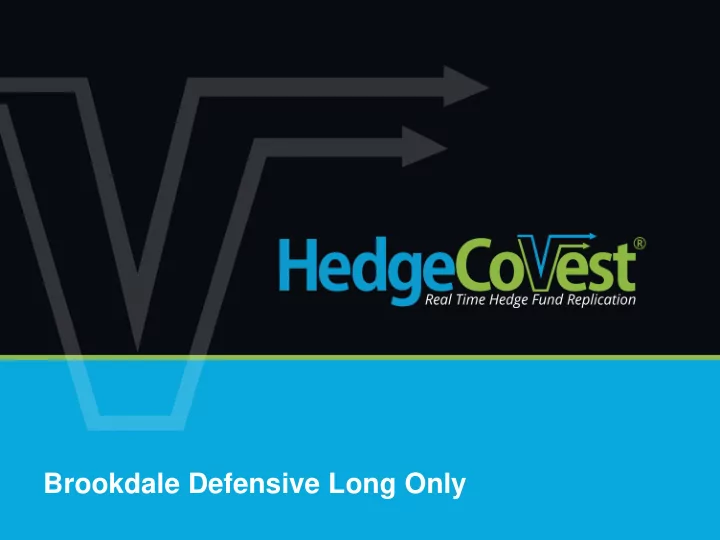

Brookdale Defensive Long Only
Strategy Overview: The Investment Manager believes that company fundamentals are not nearly as volatile as stock prices, and this may provide a compelling opportunity. In this regard, stocks generally become cheap/un-popular because investors project bad news indefinitely, and stocks get expensive/popular because investors hope for continued good news. This tends to create an asymmetric risk/reward opportunity: incremental good news helps value stocks significantly more, because it is typically not expected; but bad news typically has a much more damaging effect to expensive stocks while it is expected and usually priced into value stocks. To capitalize on this opportunity, the Investment Manager strives to combine value-driven investment strategies with a pre-defined, repeatable process for security selection and portfolio construction. The Investment Manager believes that quantitatively sourcing investment opportunities using a fundamentally- driven proprietary valuation methodology and consistently applying it through a disciplined portfolio construction framework will help avoid the emotional and behavioral mistakes often made by institutional and retail investors.
Strategy Philosophy: Security or investment selection is structured and process-driven. The Investment Manager seeks to apply the same proprietary valuation methodology to each company within its investable universe. The proprietary valuation methodology can include, but is not limited to, balance sheet metrics, consistency of operating earnings, business quality, revenue growth, profit margin, and profitability overall. These and other factors and metrics are received from corporate filings and third party data providers which can then be modified or adjusted by the Investment Manager at its discretion. The most attractive investment opportunities using the aforementioned security selection process are then assembled into a portfolio using a structured framework.
Portfolio Construction: The portfolio is constructed to have a bias towards defensive sectors. These sectors are less sensitive to marco economic changes, structural changes, and technological innovation. Earnings from companies in these sectors are more stable and consistent. Structurally, the strategy is long flight to quality. In times of economic and market stress, defensive sectors become in favor.
Risk Management: Risk management is integrated in portfolio construction and security selection. At the portfolio level, risk is mitigated through relatively small position sizes which are generally 2-5% of NAV. In addition, the strategy does not utilize leverage. Long market value is generally 100% of NAV. Exposures are kept fairly static to limit market-timing.
Winning Trade Example: Cal-Maine Foods (CALM) was the fund’s top contributor in the first half of 2015. The company was enjoying elevated margins from low input costs and high egg prices, but what moved the stock asymmetrically in our favor was the large boost in egg prices caused by the avian flu outbreak. The reduction in overall egg supply led the stock to spike ~35% in the first half of 2015 with the bulk of the gains in May. Because the stock had greater than 25% short interest, the move in the stock price was likely exaggerated from the technical tailwind driven by short sellers unwinding their position. We exited the position at a healthy gain.
Losing Trade Example: Whole Foods Market (WFM) was a detractor in the first half of 2015. We rely on valuation and cash flow to limit the downside risk when we enter a long position. The cash flow analysis includes routine maintenance capital expenditures and excludes one-off growth capital expenditures. Abnormal capital expenditures are regularly adjusted to reflect the normalized cash generation of an enterprise. Whole Foods is one of the few companies that clearly separate maintenance capital expenditures and growth capital expenditures. As you would expect, growth capital expenditures was excluded from our analysis. This was an unprofitable decision. Since the growth capital expenditures were scheduled, recurring and systematic, they should have been treated as routine and not separated. When Whole Foods reported same store sales growth lower than analyst expectations, growth-focused buyers sold. The downside risk was greater than originally anticipated. Our analysis has been adjusted, and Whole Foods is no longer a long position.
Company Overview: Based in Dallas, Texas, Brookdale Capital Management, LLC and its affiliate is a performance based investment manager established in 2011 to exclusively manage proprietary capital on behalf of its founding partners. The firm has a particular focus on liquid alternative investment strategies across all asset classes including equities, credit, commodities, currencies, and derivatives. Senior investment professionals employ relative value, arbitrage, and directional trading strategies in the public liquid markets to generate industry leading risk-adjusted returns. In 2014, the investment manager began to accept external capital into its flagship investment strategy Brookdale Equity Long/Short.
Management Bios: Prior to managing external capital at Brookdale Capital Management, LLC, Mr. Rehmatullah was a Director at Crestline Investors, Inc. (“Crestline”), a multi-billion dollar alternative investment manager based in Fort Worth, Texas. While at Crestline, Mr. Rehmatullah was Head of Strategy for Event Driven, Merger Arbitrage, Reinsurance and Multi-Strategy investing. Prior to joining Crestline in 2007, Mr. Rehmatullah was a Senior Consultant for Ryan, Inc., performing audit defense and reverse audit reviews for Fortune 500 companies. Mr. Rehmatullah received an MBA from The University of Texas at Austin, a BBA in Finance and a BS in Economics from Southern Methodist University.
Recommend
More recommend